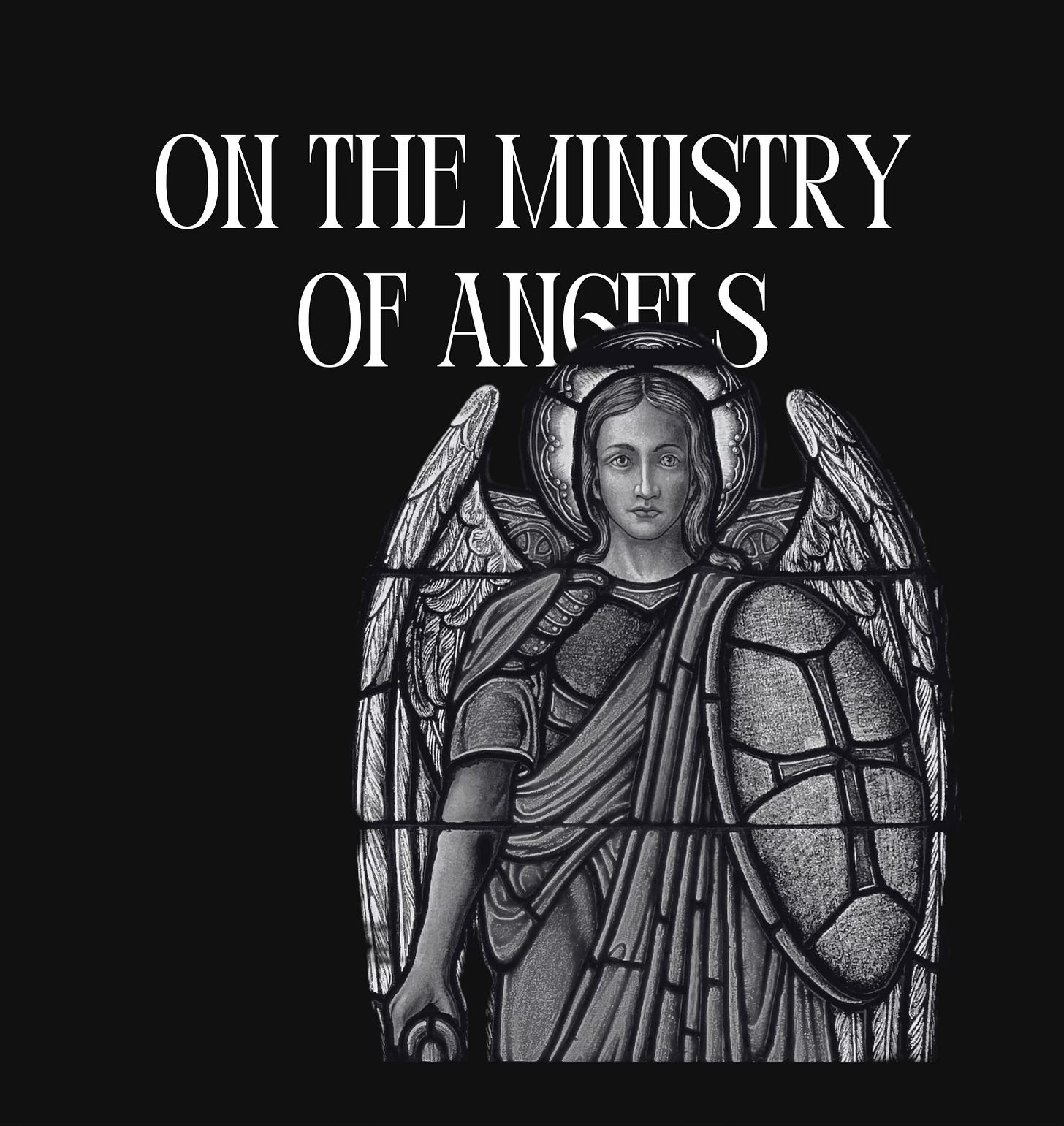Sunday sermon on the Epistle reading from Hebrews 1:10-2:3 (March 16, 2025)
In the Name of the Father and the Son and the Holy Spirit, one God. Amen.
“Are not all angels spirits in the divine service, sent to serve for the sake of those who are to inherit salvation?” (Hebrews 1:14). What is the purpose of angels? And do we have anything to do with it?
Saint Paul provides a little glimpse at who the angels are and what they do. First of all, angels are not gods. At least they are not gods in the sense that the One True God is God – the One Who has caused everything into being. The Bible actually does refer to the angels as gods (but always with a lower case “g”) and as sons of God, but none of them are theGod.
But the angels are more like us in that they were created by God, and they serve Him. And like us, some of them chose to fall away from God. People who fall away from God are called apostates; angels that do the same are called demons.
So what do the angels do? They are sent to serve for the sake of those who are to inherit salvation. And who are those who are to inherit salvation? That would be us – the humanity. So the angels’ task in ministering to God is to serve us for our salvation. Saint John Chrysostom says that Christ saves as Lord and God, but angels save as servants. The angels serve us in the greatest matters. And what could be greater than salvation?
This ministry, however, has caused some angels to fall into envy. Some of them did not agree with God’s idea of them serving us because they are higher beings. If we start questioning God’s intentions, even angels are not immune from misjudging and doing the wrong thing. They had no idea that part of God’s plan was always for His Son, Jesus Christ, to become incarnate, and thus raising our human nature as close to God as it is possible for a creature to be like its Creator.
Those angels that disagreed with God attempted to use other aspects of creation to bring down humanity as well. Those fallen angels are now called demons, and the first to fall was Satan. He coerced a serpent to tempt our first parents, Adam and Eve, into disobedience to God. And then throughout our existence the demons have always put stumbling blocks in our way.
The devil put it into Judas’ heart to betray Jesus. The devil put those thoughts into the heart of Judas, but it was Judas who allowed the thoughts to ruminate in his heart; and it was Judas, again, who acted upon those wicked thoughts. The devil tempted, but Judas acted.
That’s how the demons work – they constantly tempt. They still can’t come to terms that God had a great calling for us. So they tempt because they desire our downfall. But no matter how much they tempt us and what kind of thoughts they put into our hearts, they still can’t sin for us. We do all the sinning.
That’s where the angels come in. All of us have guardian angels from the time we are born, and especially from when we are baptized and become part of God’s Church. The angels guide us and protect us and point us towards the good and the true and the beautiful things in this life that lead to salvation. But we are the ones who have to act on this guidance. They can’t do it for us, any more than demons can sin for us.
Venerable Bede once said that “the angelic spirits are especially present to us when we give ourselves in a special way to divine services: when we enter the church, when we open our ears to sacred readings, when we give our attention to psalm singing, when we apply ourselves to prayer, when we celebrate the Liturgy. Where the mysteries of the Lord’s Body and Blood are being enacted, a gathering of the citizens from on high (that is, the angels) is present.”
How do we know that the angels are present with us and guiding us? A simple act of entering the church, according to Saint Bede, is a sign their presence. A demon would never bring us to church. Did you feel your angel guiding you today by hand to church? Try to pay more attention next time. When we listen to Scripture, pay attention to the hymns of the church, pray, and participate in the Liturgy, that’s when our angels are especially present with us.
The angels have played a major role in the history of our salvation. They appeared numerous times to the people in the Old Testament. And right before God became man, Archangel Gabriel appeared to a young woman by the name of Mary in Nazareth, bringing her the good news. Angels appeared to shepherds in the field, when the Lord was born. Gabriel counseled Joseph not to divorce Mary, and again later instructed him to flee to Egypt to avoid Herod’s slaughter of the infants. The angels sat at the empty tomb after the Resurrection; they accompanied Christ at His Ascension; they ministered to the apostles as they preached the Gospel. And they have been with us always, ministering to God for our salvation.
One question that people ask sometimes is why does God even need angels? Can’t He do it all Himself? As All-powerful God, why does He need helpers? And the answer is kind of simple: He does not need angels or us, or anyone or anything else. He can do anything and everything on His own. But God chooses to give the angels the honor of following His will and participating in the history of salvation.
It was an honor for Gabriel to tell Mary that she will conceive of the Holy Spirit and give birth to the Son of God Himself. It was an honor for the angels to be present at the empty tomb, announcing Christ’s Resurrection. It was an honor for them to witness His Ascension. It is an honor for them to participate in the eternal worship, an honor which we also get to enjoy when we join them in this worship every time we are participating in the Divine Liturgy.
And God gives us similar honors; He lets us participate in doing His will. God alone, the Gospels say, can forgive sins (Mark 2:7, Luke 5:21), but God allows us to be like Him in forgiving others (Matthew 6:12, 14-15; Matthew 18:35; Luke 6:37). That’s an honor that we get to enjoy, that’s not a responsibility.
“God is love” (1 John 4:8) Saint John the Evangelist tells us. And Jesus commands us to love others (Matthew 5:43-44; Matthew 22:37-39; John 13:34-35; John 15:12), especially those we really do not want to like or love. This commandment, again, is an honor, not a responsibility. We get to be like God in doing only what He can perfectly do.
The angels are beings who “serve [God] for the sake of those who are to inherit salvation.” God bestows on them an honor to help us and guide us toward our intended goal of eternal life with God and in God. And like the angels, we also are honored by God to start practicing being like Him in the way we love and in the way we forgive others.
And having been guided here today by our angels, let us together with them give all glory, honor, thanksgiving, and worship to the One True God: Father, Son, and Holy Spirit, always, now and ever and unto ages of ages.
Amen.
Find us on Spotify.
Intro and outro melody:
Rule of Life
Music from #Uppbeat (free for Creators!):
https://uppbeat.io/t/brock-hewitt-stories-in-sound/rule-of-life
License code: MOHT7GAHFYHX7I1Y














Share this post